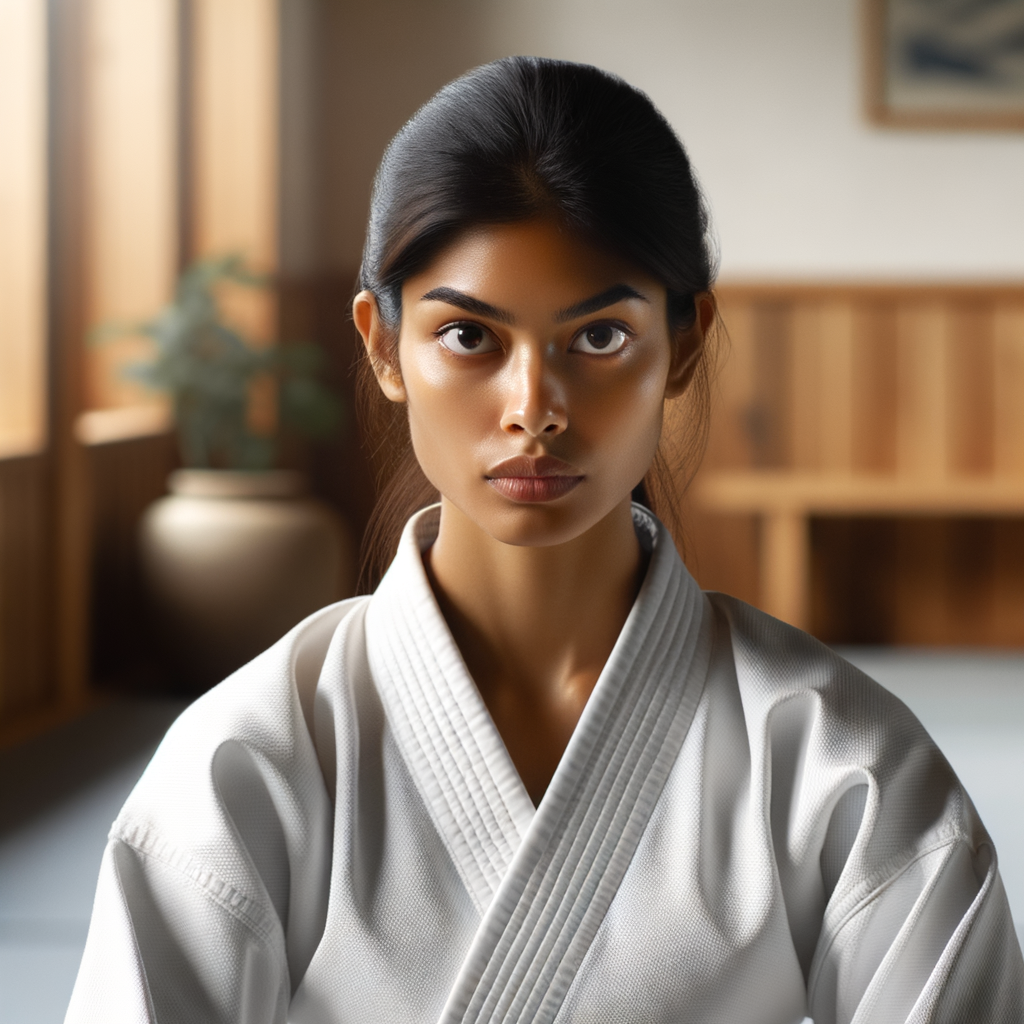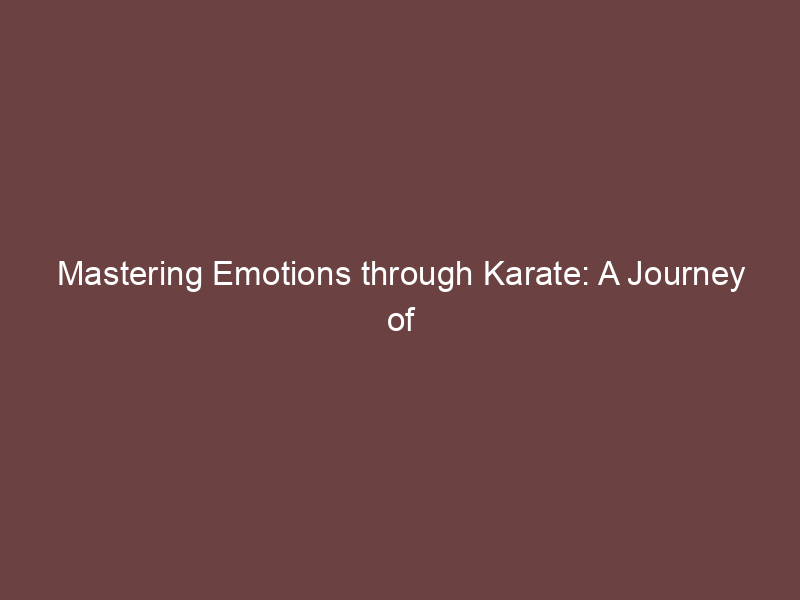
Introduction to Karate and Emotional Intelligence
Welcome to our exploration of the fascinating connection between Karate and Emotional Intelligence. This introduction will help you understand the basics of these two concepts and how they intertwine.
- Understanding the concept of Karate
- Defining Emotional Intelligence
- The connection between Karate and Emotional Intelligence
Karate is a martial art that originated in Japan. It’s not just about physical strength or fighting skills. Karate also emphasizes self-discipline, respect, and mental fortitude. Practitioners learn to control their movements precisely, which requires a high level of focus and mental clarity. This discipline and focus are part of what makes Karate a mental exercise as much as a physical one.
Emotional Intelligence, often abbreviated as EI or EQ (Emotional Quotient), is the ability to understand, use, and manage your own emotions in positive ways. It involves recognizing your own emotional state and the emotional states of others. Emotional Intelligence is crucial for communicating effectively and maintaining good relationships.
At first glance, Karate and Emotional Intelligence may seem unrelated. However, the discipline and self-awareness learned in Karate can greatly enhance one’s Emotional Intelligence. Karate training often involves understanding and controlling one’s emotions, especially under stress. This emotional control directly contributes to developing higher Emotional Intelligence.
In the following sections, we’ll delve deeper into the role of Karate training in Emotional Intelligence, how emotional understanding is applied in Karate, and key takeaways for mastering emotions through Karate. Stay tuned!
The Role of Karate Training in Emotional Intelligence
When we think of karate, we often picture high kicks and powerful punches. However, karate is not just about physical strength. It also plays a significant role in developing emotional intelligence. Let’s delve deeper into this aspect.
Understanding Emotions through Karate Practice
Practicing karate is not just about learning how to defend oneself. It’s also about understanding and managing emotions. Let’s explore how karate training aids in emotional understanding and growth.
- How Karate training helps in understanding emotions
- Examples of emotional growth through Karate
During karate training, individuals are taught to control their emotions. They learn to stay calm under pressure, which is a crucial aspect of emotional intelligence. For instance, a karateka (karate practitioner) must maintain their composure during a match, regardless of the opponent’s actions. This practice helps them understand and manage their emotions better in real-life situations as well.
Many karatekas have reported significant emotional growth through their training. For example, they have noticed improvements in their ability to handle stress, anxiety, and anger. They’ve also reported increased self-confidence and self-esteem. These are all signs of emotional intelligence.
In conclusion, karate training goes beyond physical fitness and self-defense. It also plays a significant role in developing emotional intelligence. By practicing karate, individuals can learn to understand and manage their emotions better, leading to overall emotional growth.
Emotional Intelligence in Martial Arts
Emotional intelligence plays a crucial role in martial arts, just as physical strength and agility do. It is the ability to understand, use, and manage your own emotions in positive ways to relieve stress, communicate effectively, empathize with others, overcome challenges, and defuse conflict. Let’s delve deeper into its importance and how martial arts contribute to it.
- The importance of Emotional Intelligence in martial arts
- How martial arts contribute to Emotional Intelligence
Emotional intelligence is integral to martial arts training. It helps practitioners to control their emotions, remain calm under pressure, and react appropriately in different situations. This emotional control is not just beneficial during training or competitions, but also in everyday life.
For instance, a martial artist with high emotional intelligence can better manage their fear and anxiety during a match, enabling them to perform at their best. They can also handle defeat with grace, viewing it as a learning opportunity rather than a failure.
Martial arts training can significantly contribute to the development of emotional intelligence. The rigorous physical training, discipline, and the need to remain calm under pressure can help individuals understand and manage their emotions better.
For example, during training, martial artists often face challenging situations that require them to stay composed and focused. This helps them to develop self-awareness and self-regulation, two key components of emotional intelligence.
Moreover, martial arts also teach respect and empathy towards others, which can enhance interpersonal relationships, another aspect of emotional intelligence.
In conclusion, emotional intelligence is as important as physical prowess in martial arts. It not only helps martial artists perform better but also contributes to their personal growth and development. So, the next time you step onto the mat, remember, it’s not just about the physical fight, but also the emotional one.
Emotional Understanding in Karate
Emotions play a significant role in our lives, influencing our thoughts, actions, and overall well-being. In the world of martial arts, particularly Karate, emotional understanding is a key component that is often overlooked. This section delves into the intricate relationship between Karate and feelings, shedding light on how this ancient martial art aids in expressing emotions and enhancing emotional understanding.
Linking Karate and Feelings
At first glance, Karate may seem like a purely physical discipline, but it is much more than that. It is a journey of self-discovery and emotional growth. Let’s explore how Karate helps in expressing feelings and some real-life case studies of emotional understanding in Karate.
- How Karate helps in expressing feelings
- Case studies of emotional understanding in Karate
Practicing Karate is not just about learning to punch and kick. It’s about understanding your emotions and learning to express them in a healthy way. When you perform a kata (a sequence of moves in Karate), you are not just moving your body, but also expressing your feelings. The focus, determination, and courage required in Karate help you to channel your emotions, reducing stress and anxiety.
There are numerous instances where Karate has helped individuals understand and manage their emotions better. For example, a study conducted on children practicing Karate found that they were better at controlling their anger and expressing their feelings in a constructive manner compared to their peers who did not practice Karate. Similarly, adults who practice Karate often report feeling more emotionally balanced and less prone to emotional outbursts.
In conclusion, Karate is not just about physical strength and agility, but also about emotional understanding and expression. By practicing Karate, one can learn to express their feelings in a healthier and more constructive manner.
Practicing Emotional Intelligence in Karate
Emotional intelligence is a crucial aspect of Karate, just as it is in our daily lives. It involves understanding, managing, and effectively expressing one’s own feelings, as well as empathetically recognizing and responding to the feelings of others. Let’s delve into the techniques for practicing emotional intelligence in Karate and the benefits that come with it.
- Techniques for practicing Emotional Intelligence in Karate
- Mindfulness: This involves being fully present in the moment and aware of your feelings and emotions. It helps you react appropriately to the situation at hand.
- Empathy: Understanding and sharing the feelings of others is a key aspect of emotional intelligence. In Karate, this can be practiced by understanding the emotions of your opponent.
- Self-Regulation: This is the ability to control or redirect disruptive impulses and moods. In Karate, this can be practiced by controlling your reactions during sparring sessions.
- Benefits of practicing Emotional Intelligence in Karate
There are several techniques that can help you practice emotional intelligence while training in Karate. Here are some of them:
Practicing emotional intelligence in Karate has numerous benefits. Here are a few:
| Benefit | Description |
|---|---|
| Improved Performance | By understanding and controlling your emotions, you can perform better under pressure. |
| Better Decision Making | Emotional intelligence helps you make better decisions by allowing you to understand and manage your emotions. |
| Enhanced Relationships | Understanding and empathizing with the feelings of others can lead to stronger relationships with your peers and instructors. |
In conclusion, emotional intelligence is a vital part of Karate training. By practicing mindfulness, empathy, and self-regulation, you can improve your performance, make better decisions, and build stronger relationships. So, make sure to incorporate these techniques into your Karate training and experience the benefits firsthand.
Key Takeaways: Mastering Emotions through Karate
As we conclude our exploration of Karate and emotional intelligence, let’s summarize the key points we’ve learned. These insights will help you understand the profound impact Karate can have on your emotional growth and well-being.
- Summary of the Role of Karate in Emotional Intelligence
- Importance of Understanding Emotions in Karate Practice
- Final Thoughts on Emotional Growth through Karate
Karate is much more than a physical discipline. It is a holistic practice that nurtures both the body and the mind. By training in Karate, individuals learn to control their emotions, respond rather than react to situations, and develop a deeper understanding of themselves and others. This emotional intelligence is a crucial life skill, helping us navigate relationships, challenges, and opportunities with grace and resilience.
Emotions play a significant role in Karate. Understanding and managing emotions is crucial to mastering the art. When you understand your emotions, you can channel them into your practice, enhancing your performance and focus. Moreover, recognizing and respecting the emotions of others promotes a positive and respectful training environment.
Emotional growth is a lifelong journey, and Karate can be a powerful ally on this path. By practicing Karate, you can develop emotional intelligence, self-awareness, and resilience. These skills will serve you well in all areas of life, from personal relationships to professional endeavors. So, whether you’re a seasoned Karate practitioner or just starting your journey, remember that every punch, kick, and kata is an opportunity for emotional growth.
As we’ve seen, Karate is more than a martial art. It’s a tool for emotional growth and intelligence. So, step onto the mat, and let your journey begin.
Additional Resources
If you’re interested in further exploring the connection between karate and emotional intelligence, there are numerous resources available. These resources can provide additional insights and deepen your understanding of both topics.
- Books on Emotional Intelligence and Karate: There are many books that delve into the subjects of emotional intelligence and karate. Some notable titles include “Emotional Intelligence 2.0” by Travis Bradberry and Jean Greaves, and “The Art of Karate: Discovering the Wisdom Within” by Robert Spear. These books provide a comprehensive understanding of how emotional intelligence can be enhanced through the practice of karate.
- Online courses on Karate and Emotional Intelligence: Online platforms offer courses on both karate and emotional intelligence. These courses are designed to help you understand the principles of karate and how they relate to emotional intelligence. They often include video tutorials, interactive exercises, and quizzes to test your understanding.
- Experts to follow for more insights: There are many experts in the field of emotional intelligence and karate who share their knowledge and insights online. Some of these experts include Daniel Goleman, a psychologist and author known for his work on emotional intelligence, and Gichin Funakoshi, a renowned karate master. Following these experts can provide you with a wealth of information and inspiration.
By utilizing these resources, you can continue to expand your knowledge and understanding of the powerful connection between karate and emotional intelligence. Remember, the journey to mastering both is a continuous one, so keep learning and practicing!






